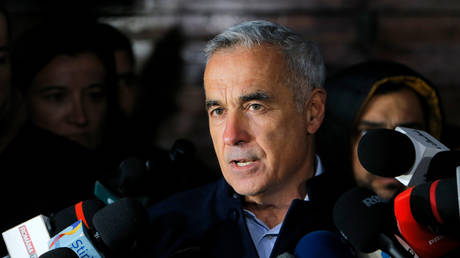Biden’s HBCU office promotes Wells Fargo products in email newsletter before backtracking
Education Department says it sent the ‘inappropriate’ email touting the bank by ‘mistake’


The Biden administration’s office for historically Black colleges and universities on Tuesday sent an email newsletter that prominently featured content written directly by Wells Fargo and linked to promotional material for the bank’s debit card products.
The email was sent by the Department of Education, which houses and operates the White House Initiative on Advancing Educational Equity, Excellence and Economic Opportunity through Historically Black Colleges and Universities. Several hours later, the Education Department re-sent the same newsletter without any Wells Fargo content, and an agency spokesperson called the episode a "mistake."
The initial email included two paragraphs that were copied word-for-word, without quotation marks, from a Dec. 20 promotional item that was published on Wells Fargo’s website, discussing the bank’s sponsorship of four HBCU football games.
The newsletter also invited readers to “customize your banking experience with Wells Fargo’s HBCU Legends’ Collection,” linking to marketing materials about debit cards offered by the bank that are co-branded with HBCU logos or mascots.
"The email that was sent out today was inappropriate and the Department has already taken steps to ensure a mistake like this does not happen again," an Education Department spokesperson said in an email, adding that the White House HBCU Initiative doesn't have a partnership with Wells Fargo.
A representative for Wells Fargo did not respond to an inquiry about whether the bank was involved in the creation of the newsletter.
The weekly newsletter is available to the public and sent to subscribers who elect to receive information about HBCUs from the Education Department. The newsletter does not appear to be published online but was received by a POLITICO reporter who was signed up for the list.
In total, the email, which featured Wells Fargo’s logo, included at least eight different links to Wells Fargo content, including the bank’s job openings and various pages describing its diversity and inclusion efforts. It included, for example, a link to a Wells Fargo video on YouTube promoting the bank’s sponsorship of HBCU football games. And the email also linked to content sponsored by Wells Fargo on the website Blavity titled “Wells Fargo Is Showing Up for HBCUs.”
The newsletter included a disclosure at the bottom that says its content is not meant to be an endorsement of any “products or services offered.” But the promotion of a major bank is a departure for the typical content of the weekly missive, which usually focuses on job opportunities, programs or grants that are available for HBCU students and graduates across various federal agencies.
The email from the Education Department promoting Wells Fargo comes after other parts of the Biden administration have cracked down on the bank.
The Consumer Financial Protection Bureau in December hit the company with a $3.7 billion penalty, the largest ever for the agency, as part of a settlement to resolve allegations that Wells Fargo mismanaged auto loans, mortgages and deposit accounts. On Tuesday, apparently coincidentally, the CFPB published information on how millions of consumers would be able to access some of the money from that settlement.
The Education Department regulates financial products that are marketed to college students or part of agreements between universities and banks, including some of those that are offered by Wells Fargo.
A CFPB report last year criticized the department for essentially taking a lax approach to enforcing those regulations, which are known as “cash management” rules. The Education Department announced earlier this month that it plans begin the process of revising those regulations.
More than three dozen universities have reported to the Education Department that they have agreements with Wells Fargo to offer campus financial products, according to information published on the agency’s website.












